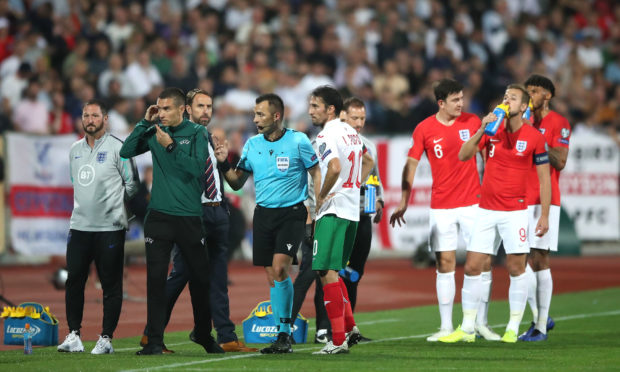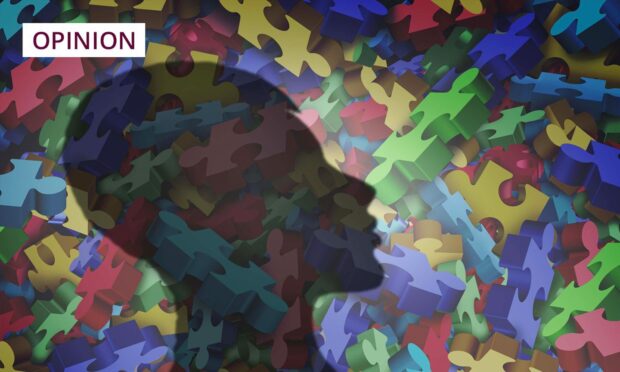Sir, – After a week of being accused of being a racist, despite being an anti-racist and in the past an active anti-racist, The Courier’s Stefan Morkis added his two pennies’ worth in his Saturday Journal column, accusing me of “blithely” discussing racism when I should be “checking my privilege” (“Supporters have to be held to account for racist chants”, October 26).
Having read, studied and written about not only racism but also the increasing policing of language for almost 20 years, Mr Morkis will excuse me if I feel I am able to contribute something to this discussion, despite the colour of my skin.
I could find black colleagues who would argue the same points as I do, which may allow Mr Morkis to take them more seriously, but they would no doubt feel patronised that their ideas were listened to not because of the content of what they said (or their “character” as Martin Luther King put it) but because of the colour their skin.
Some of them would no doubt point out that Mr Morkis’s approach is in fact a modern form of racial thinking.
Mr Morkis went on to suggest that I take neither racism nor anti-racism seriously.
Nothing could be further from the truth, indeed my arguments about the Bulgaria match were, in part, about the chauvinistic way we have depicted Bulgaria and Bulgarians as a bunch of backward racists.
Finally, if we are going to take the race debate seriously, we need more conflicting ideas not fewer, whatever the colour of people’s skin.
We need to ask ourselves if treating black people and black players differently helps or hinders anti-racism?
We need to question whether educating a generation of young people that words hurt, empowers them or takes away power. And we need to ask whether closing down debate with the insult of “racist” does society any good?
Stuart Waiton,
Laird Street,
Dundee.
Report’s grim Brexit outlook
Sir, – As we gear up to a December election, the first economic assessment of Boris Johnson’s Brexit deal has indicated the incredibly damaging impact it will have on the UK economy.
Research by the National Institute of Economic and Social Research (NIESR) has revealed that GDP would be 3.5% lower in 10 years’ time under the deal, leaving the UK a staggering £70 billion worse off than we had remained in the EU.
This is not quite the “sunny uplands” the Brexiteers have repeatedly promised.
NIESR said approval of the Prime Minister’s deal “would reduce the risk of a disorderly outcome but eliminate the possibility of a closer trading relationship with the EU”.
However, despite the agreement between the EU and the UK removing uncertainty, customs and regulatory barriers would “hinder goods and services trade with the continent leaving all regions of the United Kingdom worse off than they would be if the UK stayed in the EU.”
The report also found the proposed free trade deal with the EU was slightly worse for the economy than Theresa May’s deal of last year.
When voters mark their X in the box, these figures lay bare the economic future that faces the nation and the major impact that their choice will have.
Alex Orr,
Marchmont Road,
Edinburgh.
Brexit will destroy our NHS
Sir, – When Boris Johnson and his right wing Tory Party win the general election they will very quickly be looking to the United States to make trade deals.
Many people have used importing chlorinated chicken from the US as an example of what we can expect from this relationship. Far worse is the future deals that will impact our NHS.
It’s true that all politicians have promised that the NHS will not be for sale.
That will not stop the cost of medication from the US being massively more expensive that what we currently pay.
Bizarrely, the US is the most unhealthy developed country in the world. Despite spending more than $3 trillion per year on health, their citizens are becoming sicker.
The fact is many millions of Americans cannot afford any health insurance at all.
Twenty five percent of the cash they spend on health goes on administration costs. Much of the rest goes on medication costs, with very little being spent on preventative measures.
A significant amount is also spent on what they call “defensive medicine”. That means a massive amount of totally unnecessary tests are carried out. These tests are big money-makers, and also help doctors cover their backs in the litigatious society that is the US.
My prediction is the impact of hitching our NHS to the American system will cause the demise of the NHS as we know it.
Harry Key,
20 Mid Street,
Largoward.
A bright idea for wind power
Sir, – In reference to the letters about wind farms in Tuesday’s Courier, October 29.
Why don’t we have small blades at the tops of the hundreds of thousands of street lights? They would work even in light winds and there are already electrical connections that can be used.
Michael Malone,
3 Panbride Place,
Carnoustie.
Give us Indy for Kirkcaldy too
Sir, – I agree with Mr Jack Phimister (“Kirkcaldy needs its own council”, Letters, October 28). The Langtonians should take back power from Fife Council; the 1975 “reform” of Scottish local government was a retrograde step.
Towns of the size of Kirkcaldy should be allowed to handle their own affairs; in the best democracy on Earth, Switzerland, it’s absolutely normal.
An important aspect of devolution is that it weakens the power of the media; the smaller the unit of government, the easier it is to buttonhole one’s councillor or M(S)P, and find things out immediately.
George Morton,
29 Hudson Road,
Rosyth.
Can ScotRail please explain
Sir, – I would like to know the reason for the abrupt cancellation of the 21.03 train from Broughty Ferry to Dundee on the night of Wednesday October 29.
To say that this caused inconvenience hardly covers it. Being stranded alone on a deserted station late at night in the cold was bad enough for me, but I did at least have enough money with me to hire a taxi and get to Dundee Station in time for my connection.
Other people might not have been so lucky.
There can be no excuse for ScotRail treating customers like this. Customers rely on trains being there when they are supposed to be.
I understand things can happen to delay trains, however I am appalled to discover there do not seem to be contingency plans. This is clearly unacceptable.
I agree rail travel is good for reducing carbon footprints and the future of the planet. It must, however, deliver!
David Potter,
12 Hendry Road,
Kirkcaldy.
Missing a crucial candidate
Sir, – A pity your front page picture (October 30) of Boris Johnson, Jeremy Corbyn and Nicola Sturgeon did not include Jo Swinson, as the latter is the only one who could have the support of many of us in the general election.
Arthur Davis,
The Haining,
Atholl Park,
Dunkeld.










